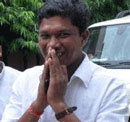 Bhubaneswar, April 26: Odisha MLA Jhina Hikaka was today released unharmed by Maoists at a village in Koraput, 33 days after he was abducted from the same district by the rebels.
Bhubaneswar, April 26: Odisha MLA Jhina Hikaka was today released unharmed by Maoists at a village in Koraput, 33 days after he was abducted from the same district by the rebels.
Clad in a green kurta and pajama, Hikaka was escorted by a group of tribals to Balipeta village in Maoist-affected Narayanpatna area, where he was believed to have been produced in a Maoist 'praja' (people's) court which agreed to set him free.
The ruling BJD legislator was handed over by the tribals to his wife, Kaushalya Majhi, and a lawyer who fights cases for the ultras and their frontal organisations, Nihar Ranjan Patnaik.
"I am thankful to the tribals and the media for their support. I was very anxious to see him," a relieved and delighted Kaushalya said immediately after meeting her husband.
A medical team, which was present at Balipeta, would examine the 37-year-old, first-time legislator.
The release was officially confirmed here by Home Secretary U N Behera who said, "The MLA has been freed by the Maoists."
According to the Maoist Andhra-Odisha Border Special Zonal Committee (AOBSZC) which had held him captive and produced him before a 'praja' court, Hikaka had given a written undertaking that he would resign from the state Assembly and from the BJD and work for the people.Looking cheerful and smiling after his gruelling ordeal, Hikaka said, "I am free now. I am in good health.
"I was treated quite well and not tortured, " he said shaking hands with the lawyer.
He said he did not have an idea where he was held by the Maoists, who moved him from place to place all through his captivity.
The Maoists had refused to hold talks with the state government on their demands through mediators. They had extended the deadline for release of 29 prisoners unconditionally four times for the release of Hikaka.
When the government failed to fully agree to the terms set by the ultras, they announced that Hikaka, who was kidnapped on March 24 when he was returning home to Laxmipur from Koraput town, would be tried in a 'praja' court.
Another Maoist group, the Odisha State Organising Committee had kidnapped two Italian nationals Claudio Colangelo and Paolo Bosusco on March 14 in Kandhamal district.
Colangelo was released on March 25 and Bosusco on April 12.
The hostage crisis took place about a year after the abduction of then Malkangiri district collector R Vineel Krishna in February 2011.






Comments
Add new comment